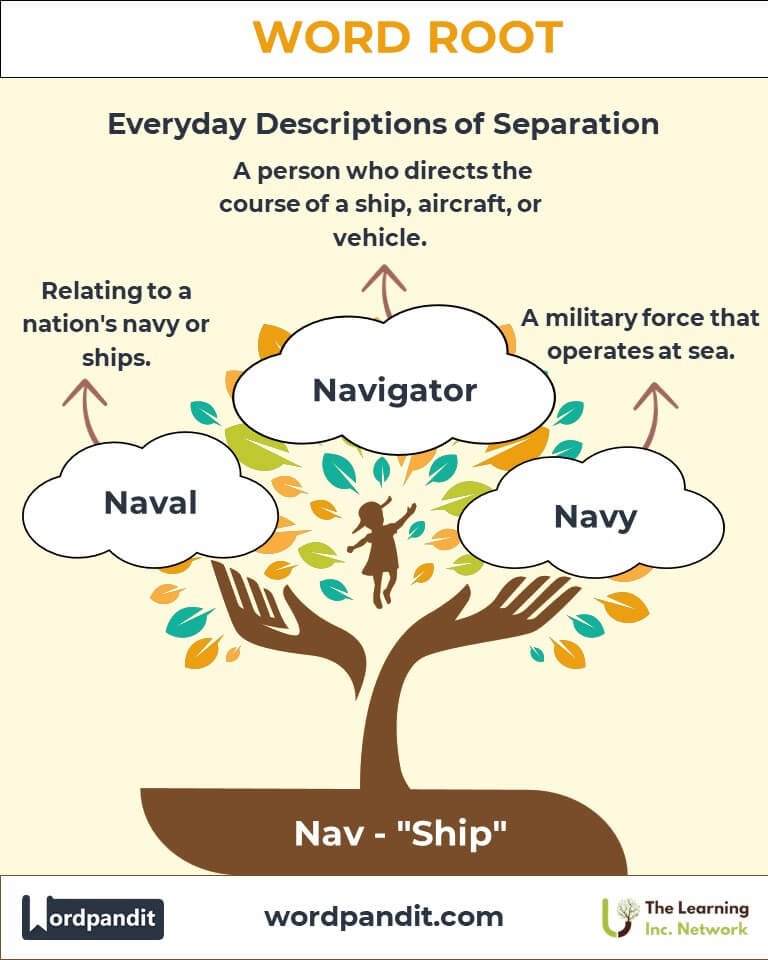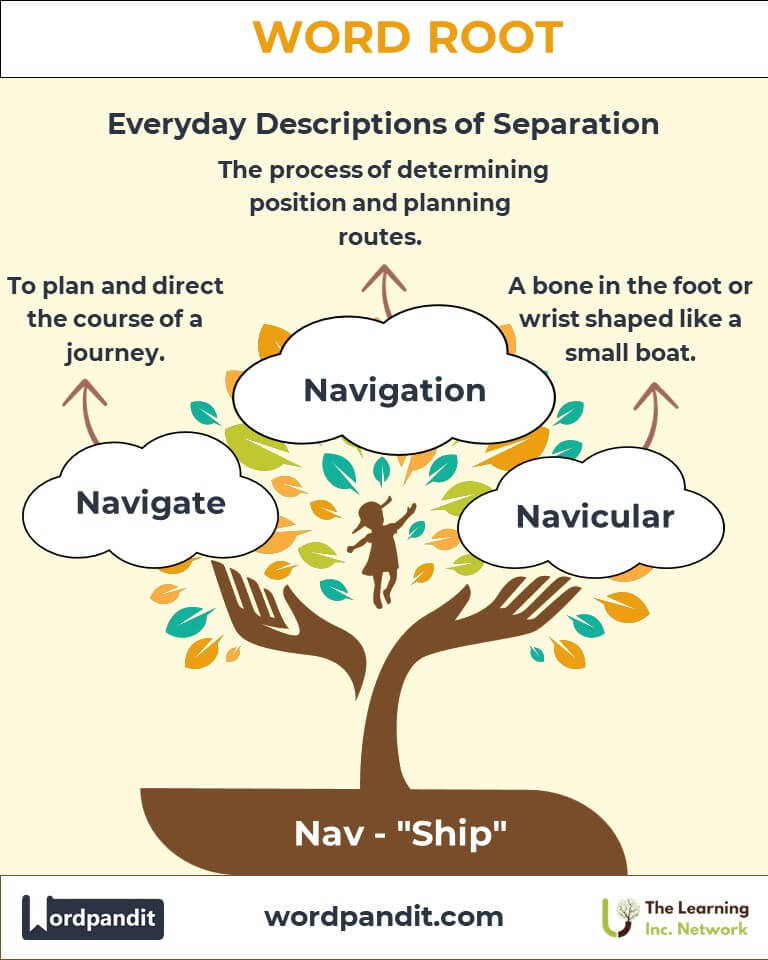Nav: The Root of Maritime Adventure and Direction
Dive into the fascinating world of "Nav," a root derived from the Latin "navis," meaning "ship." This root anchors a rich vocabulary of words tied to exploration, navigation, and the seafaring spirit. From "naval fleets" to the art of "navigating," "Nav" has charted its course through history and language.

Table of Contents
- Introduction: The Essence of Nav
- Etymology and Historical Journey
- Mnemonic: Unlocking the Power of Nav
- Common Nav-Related Terms
- Nav Through Time
- Nav in Specialized Fields
- Illustrative Story: Nav in Action
- Cultural Significance of the Nav Root
- The Nav Family Tree
- FAQs About the Nav Root
- Test Your Knowledge: Nav Mastery Quiz
- Conclusion: The Enduring Legacy of Nav
Introduction: The Essence of Nav
Picture yourself standing on the deck of a grand ship, feeling the pull of the open sea. The root "Nav," pronounced "nav," derives from the Latin navis, meaning "ship." It forms the foundation of words related to ships, sailing, and navigation. Whether steering through tumultuous seas or mapping the stars to chart a course, "Nav" represents humanity's unyielding desire to explore and conquer the unknown.

Etymology and Historical Journey
The Latin navis referred to ships and seafaring, essential for trade, exploration, and warfare. Over centuries, "Nav" gave rise to words in various languages that encapsulate the maritime spirit. The Romans' naval prowess influenced European languages, embedding "Nav" in terms like "navigate" and "naval." The Age of Exploration further expanded its usage, as seafarers relied on navigation to traverse oceans and discover new worlds.
Mnemonic: Unlocking the Power of Nav
To remember "Nav," think of a ship's helm guiding a vessel across the vast sea.
Mnemonic Device:
"Nav is the navigator's compass, steering us through seas of discovery."
Common Nav-Related Terms
- Naval (nay-vuhl):
Definition: Relating to a nation's navy or ships.
Example: "The naval fleet was deployed to protect the coastline." - Navigate (nav-uh-gayt):
Definition: To plan and direct the course of a journey, often by sea or air.
Example: "He learned to navigate using the stars as a guide." - Navigator (nav-uh-gay-tor):
Definition: A person who directs the course of a ship, aircraft, or other vehicle.
Example: "The navigator plotted the safest route through the storm." - Navigation (nav-uh-gay-shun):
Definition: The process or activity of accurately ascertaining one’s position and planning a route.
Example: "Advances in GPS technology have revolutionized navigation." - Navicular (nav-ik-yoo-lur):
Definition: Shaped like a small boat; often used in anatomy to describe certain bones.
Example: "The navicular bone in the foot plays a crucial role in walking."
Nav Through Time
- Navy (Ancient to Modern): Originating from "navis," it initially referred to ships and later to a nation's maritime force.
Historical Shift: From defending coastal cities to global naval supremacy. - Navigate (Evolving): Originally a maritime term, it now applies broadly, including navigating digital spaces.
Modern Use: "She navigated the complex corporate structure with ease."
Nav in Specialized Fields
- Military and Defense:
Naval: Refers to military forces operating on the sea.
Example: "Naval strategies were critical in World War II." - Technology and Space Exploration:
Navigation: Used in designing autonomous vehicles and space exploration systems.
Example: "NASA's navigation systems ensure precise planetary landings." - Medicine:
Navicular Bone: A bone in the human foot or wrist.
Example: "Injuries to the navicular bone can impede mobility."
Illustrative Story: Nav in Action
Captain Elena stood on the deck of her ship, the Stellar Navis, staring at the vast expanse of uncharted waters ahead. The voyage was perilous, but her navigator, Isaac, had mastered the art of celestial navigation. As they encountered a fierce storm, Isaac’s skill in interpreting the stars and waves guided them to safety. Elena reflected on how the spirit of "Nav" — courage, exploration, and precision — had steered humanity through its greatest challenges.
Cultural Significance of the Nav Root
The root "Nav" symbolizes human ingenuity and exploration. From ancient mariners relying on the stars to modern GPS systems, navigation has been central to human progress. Stories of naval conquests and maritime trade have shaped cultures, while metaphors like "navigating life's challenges" show its relevance beyond the seas.

The Nav Family Tree
- Naut (Greek: "sailor"):
Astronaut: A sailor of the stars.
Example: "The astronaut navigated through zero gravity." - Port (Latin: "harbor, gate"):
Port: A place where ships dock.
Example: "The bustling port was a hub of trade." - Mar (Latin: "sea"):
Marine: Related to the sea.
Example: "Marine biology studies the ocean's ecosystems."

FAQs About the "Nav" Word Root
Q: What does "Nav" mean, and where does it come from?
A: The root "Nav" originates from the Latin word navis, meaning "ship." It forms the basis of many words related to ships, seafaring, and navigation, highlighting its maritime heritage and the critical role of ships in trade, exploration, and warfare throughout history.
Q: How is "Nav" used in modern contexts?
A: While "Nav" retains its nautical connotation, it has expanded into modern fields. For example, "navigation" is now widely used in technology, referring to GPS systems and digital mapping, while "naval" remains essential in military discussions about sea-based forces.
Q: What is the origin of the word "navigate"?
A: The word "navigate" comes from the Latin navigare, which combines navis (ship) and agere (to drive). It originally referred to steering or directing a ship but now encompasses planning and directing any journey, including space exploration and digital navigation.
Q: Is "Nav" connected to anatomy?
A: Yes, the term "navicular" in anatomy refers to a bone in the foot or wrist shaped like a small boat. This connection emphasizes how the shape of the bone resembles a vessel, demonstrating the root's versatility beyond maritime usage.
Q: How does "Nav" apply to space exploration?
A: Navigation principles originally developed for maritime use are now crucial in space exploration. Terms like "navigational systems" and "astronaut" (from naut, meaning sailor) reflect the shared techniques and challenges of charting courses across uncharted waters and space.
Test Your Knowledge: Nav Mastery Quiz
1. What does "Nav" mean?
2. Which term describes military forces on the sea?
3. What is the root of "Navigate"?
4. Which bone is named after its boat-like shape?
5. What does "Navigator" mean?
Conclusion: The Enduring Legacy of Nav
The root "Nav" embodies humanity's enduring relationship with exploration, direction, and the vast unknown. From ancient maritime adventures to navigating digital realms, "Nav" continues to steer our understanding of the world. Let it inspire you to chart new courses and embrace the journey of discovery.














